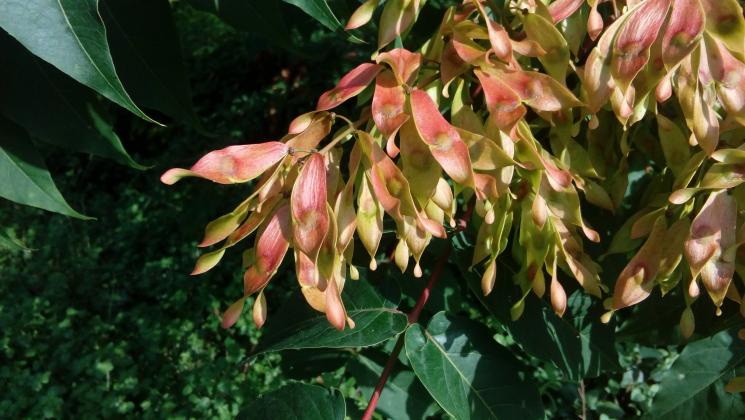Ailanthus altissima – Honey, silk, an inspirational invasive
Ailanthus altissima, tree of heaven, TOH, is an Asian native found on every continent except Antarctica. It grows rapidly and can be 50 feet tall. Trunk and branches have lenticels, pores, and heart-shaped scars left on the branch after a leaf falls. Its compound leaves are 1 to 4 feet long with 10 to 25 leaflets. Each leaflet is 2 to 7 inches long and 1 to 2 inches wide. Bronze leaves in spring change to green as they age. In late spring, clusters of small, yellow-green to reddish 5-petaled flowers are seen. In Texas from September to October, up to 350,000 winged seeds per year appear in papery structures called samaras. They can stay on the tree through winter.
TOH has an unpleasant odor described as rancid nuts and worse. At first honey made from the flowers tastes bad but when aged is excellent. A. altissima is in the Food and Drug Administration Poisonous Plant Database at fda.gov. Traditional systems use TOH to treat cancer, malaria, as an anti-inflammatory, antimicrobial, etc. It’s being studied as a source for natural insecticides and herbicides. The USDA Forest Service has information about TOH medicinal and other uses in their article “Ailanthus altissima” at fs.fed.us.
TOH came to the U.S. in the 18th century as a fast-growing ornamental and host plant of the moth Samia Cynthia. The moth produces silk that is stronger and cheaper than ordinary silk though not as glossy. But TOH is aggressive, not easily controlled and able to grow in concrete cracks. Seeds have been found 2 miles from the nearest tree. Seedlings establish a taproot 3 months after germination. It can burn to the ground and root suckers will survive and grow another tree. It produces the chemical ailanthone which is allelopathic meaning it inhibits the growth of other plants. TOH is invasive in Texas and many other places.
When European cities were devastated by World War II fighting, TOH was often the first plant to grow back. The same is true now in some war-torn cities in the Middle East. The ability of TOH to thrive in harsh environments inspired the 1943 best-selling novel, “A Tree Grows in Brooklyn” by Betty Smith. It’s about a young girl growing up in Brooklyn, NY during difficult times. In the book, TOH is a metaphor for the girl’s struggles and triumphs.
The book was so inspirational that during World War II it was one of the most popular of the books chosen to be shipped for free to soldiers overseas. These Armed Services Editions were made small enough to fit into a uniform pocket. The intent was to not only entertain soldiers but to also educate them about political, historical and military issues. More than 122 million copies of more than 1,300 titles were distributed to soldiers. The motto was “Books are weapons in the war of ideas”.
The book list is in the Wikipedia article “List of Armed Services Editions” at en.wikipedia.org.
Deborah Richardson is a freelance reporter for The Examiner with a fondness for flora in its natural setting.

